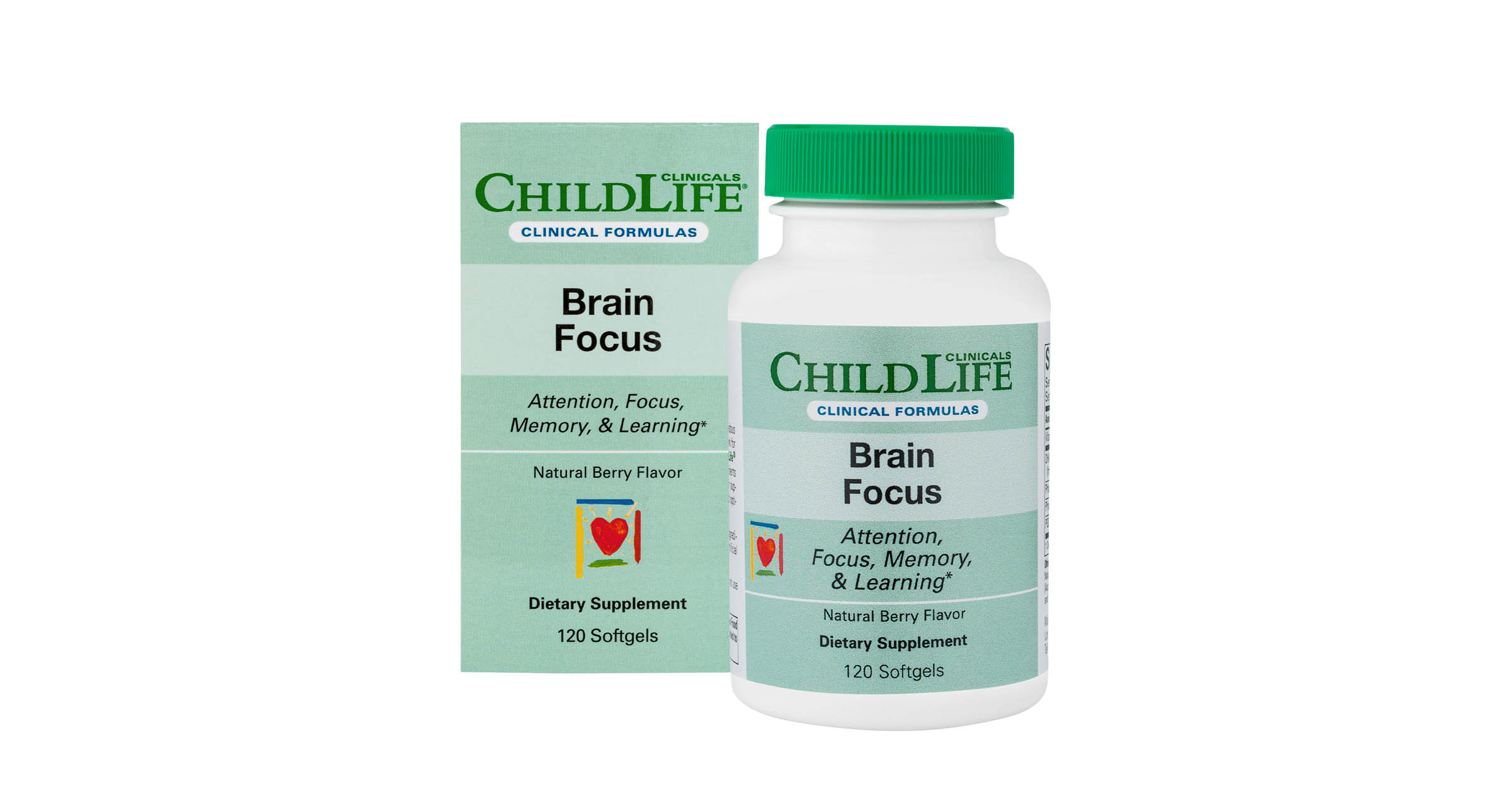Healthy Attention, Focus, Memory, & Learning*
Ingredients (per 6 Softgels):
- 7 mg Vitamin B6 (Pyridoxal 5’-Phosphate)
- 150 mg DHA (docosahexaenoic acid) from Algal Oil
- 60 mg Phosphatidylserine
- 60 mg Phosphatidylcholine
- 5 mg PQQ (Pyrroloquinoline quinone)
Optimize Early-Life Health with ChildLife® Clinicals Brain Focus.
Key Benefits*
- SUPPORTS healthy brain functions
- DELIVERS Phospholipids and the Fatty Acid DHA
- PROMOTES healthy brain development
- INCLUDES ingredients with antioxidative properties
* These statements have not been evaluated by the Food and Drug Administration. This product is not intended to diagnose, treat, cure, or prevent any disease.
Purpose: To provide clinicians with technical information to determine if the supplement in question is appropriate for their patient.
Brain Focus
ChildLife® Clinicals Brain Focus contains a unique blend of natural ingredients that work to support healthy brain development, and function.
Childhood Brain Development
Childhood is a critical period for brain development and growth, with brain weight increasing four-fold by age 6.1 Proper childhood nutrition is fundamental to brain development, especially the omega-3 fatty acids DHA (docosahexaenoic acid) and EPA (eicosapentaenoic acid). Approximately 50% of the neuronal membrane is composed of fatty acids.2
Learning, and Attention
Learning and attention are two intrinsic operations of the brain, where disorders in such are noticeable at an early age in childhood. The current prevalence of ADHD in U.S. children is approximately 9.4%.3 Abnormal fatty acid profiles are higher in children diagnosed with ADHD.4 Nutrients and essential fatty acids are critical to support normal brain functions such as learning.
Docosahexaenoic Acid
Brain changes associated with behavior and learning occur as a result of supplementation with DHA.5
Supplementation with Omega-3 Fatty Acids, including DHA have shown improvements to cognitive performance in children with ADHD.4 DHA supplementation has shown improvement in school-aged children with poor initial reading scores.6
Phosphatidylserine & Phosphatidylcholine
Phospholipids are essential components of cell membranes. Phosphatidylserine can be made endogenously, and absorbed through dietary intake. Phosphatidylserine crosses the blood brain barrier and supports cognition and learning in the human brain.7
In a study on children with ADHD, supplementation with phosphatidylserine significantly improved symptoms and short-term memory.8
Phosphatidylcholine is another important phospholipid of cell membranes, and can be a source of choline for acetylcholine production. Animal studies show improved memory with phosphatidylcholine supplementation in a cognitively impaired model.9
Pyrroloquinoline quinone
Pyrroloquinoline quinone (PQQ) is not synthesized by the body but is found in a wide range of foods.10
Studies have shown the reduced form of Pyrroloquinoline quinone to work as both an antioxidant and antioxidant regenerator, which offers neuron protection from oxidative stress.11
Studies in animal models show impaired growth with diets lacking PQQ.12 Further, diets supplemented with PQQ, improved growth rates.13
A study addressing learning and memory functions in rats showed significantly better learning when supplemented with PQQ compared to control.14
A study conducted on humans for safety at a dose of 60 mg/d revealed no adverse effects or changes in urine analysis.15 ChildLife Clinicals Brain Focus delivers 5 mg PQQ per 6 softgels.
References:
- Dobbing J, Sands J. Quantitative growth and development of human brain. Arch Dis Child. 1973;48(10):757–767. doi:10.1136/adc.48.10.757.
- Yehuda S, Rabinovitz S, Mostofsky DI. Essential fatty acids and the brain: from infancy to aging. Neurobiol Aging. 2005;26:98-102.
- Danielson ML, Bitsko RH, Ghandour RM, Holbrook JR, Kogan MD, Blumberg SJ. Prevalence of Parent-Reported ADHD Diagnosis and Associated Treatment Among U.S. Children and Adolescents, 2016. J Clin Child Adolesc Psychol. 2018;47(2):199–212.
- Chang JP, Su KP, Mondelli V, Pariante CM. Omega-3 Polyunsaturated Fatty Acids in Youths with Attention Deficit Hyperactivity Disorder: a Systematic Review and Meta-Analysis of Clinical Trials and Biological Studies. Neuropsychopharmacology. 2018;43(3):534–545.
- Kuratko CN, Barrett EC, Nelson EB, Salem N Jr. The relationship of docosahexaenoic acid (DHA) with learning and behavior in healthy children: a review. Nutrients. 2013;5(7):2777–2810.
- Richardson AJ, Burton JR, Sewell RP, Spreckelsen TF, Montgomery P. Docosahexaenoic acid for reading, cognition and behavior in children aged 7-9 years: a randomized, controlled trial (the DOLAB Study). PLoS One. 2012;7(9):e43909. doi:10.1371/journal.pone.0043909.
- Glade MJ, Smith K. Phosphatidylserine and the human brain. Nutrition. 2015;31(6):781-6. doi: 10.1016/j.nut.2014.10.014.
- Hirayama S, Terasawa K, Rabeler R, Hirayama T, Inoue T, Tatsumi Y, Purpura M, Jäger R. The effect of phosphatidylserine administration on memory and symptoms of attention-deficit hyperactivity disorder: a randomised, double-blind, placebo-controlled clinical trial. J Hum Nutr Diet. 2014;27(2)284-91. doi: 10.1111/jhn.12090.
- Chung SY, Moriyama T, Uezu E, Uezu K, Hirata R, Yohena N, Masuda Y, Kokubu T, Yamamoto S. Administration of phosphatidylcholine increases brain acetylcholine concentration and improves memory in mice with dementia. J Nutr. 1995;125(6):1484-9.
- Akagawa M, Nakano M, Ikemoto K. Recent progress in studies on the health benefits of pyrroloquinoline quinone. Biosci Biotechnol Biochem. 2016;80(1):13-22. doi: 10.1080/09168451.2015.1062715.
- Ouchi A, Ikemoto K, Nakano M, Nagaoka S, Mukai K. Kinetic study of aroxyl radical scavenging and α-tocopheroxyl regeneration rates of pyrroloquinolinequinol (PQQH2, a reduced form of pyrroloquinolinequinone) in dimethyl sulfoxide solution: finding of synergistic effect on the reaction rate due to the coexistence of α-tocopherol and PQQH2. J Agric Food Chem. 2013;61(46):11048-60.
- Steinberg F, Stites T, Anderson P, et al. Pyrroloquinoline quinone improves growth and reproductive performance in mice fed chemically defined diets. Exp. Biol. Med. 2003;228:160–166.
- Steinberg FM, Gershwin ME, Rucker RB. Dietary pyrroloquinoline quinone: growth and immune response in BALB/c mice. J. Nutr. 1994;124:744–753.
- Ohwada K, Takeda H, Yamazaki M, et al. Pyrroloquinoline quinone (PQQ) prevents cognitive deficit caused by oxidative stress in rats. J. Clin. Biochem. Nutr. 2008;42:29–34.
- Rucker R, Chowanadisai E, Nakano M. Potential physiological importance of pyrroloquinoline quinone. Altern. Med. Res. 2009;14:268–277.

